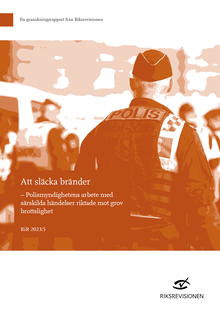Special events against serious crime can do more harm than good
When the Swedish Police Authority employs the ‘special event’ management approach to combat serious crime over a long period of time, it does more harm than good. In particular, this is because it often involves transferring resources, which has adverse implications in the local police districts that have to provide resources.

Photo: Daniel Holking
A special event is a management approach employed by the police for incidents for which ordinary police operations are not suitable. The operations are then managed in a separate procedure, and resources and expertise can be mobilised rapidly.
The audit of the Swedish National Audit Office shows that special events can be an effective way of heading efforts in the initial hours or days after a serious crime has been committed. However, special events that go on for a long period of time do more harm than good. In particular, this is because they often involve transferring resources, which has adverse implications in the local police districts that provide resources. The Swedish National Audit Office therefore considers that combating serious crime should not be done through lengthy special events.
“The police need to use their resources more efficiently. Special events that go on for a long period of time can eventually lead to parallel management systems and inefficient resource utilisation,” comments Auditor General Helena Lindberg.
The majority of the employees at the police who were queried by the Swedish National Audit Office in its audit state that special events have the greatest effect in the short-term perspective. Almost one third of the local police district heads who responded to the Swedish National Audit Office’s survey also state that special events targeting serious crime could largely have been addressed by the line operations, supported by clearer management and governance.
The audit also shows that deficiencies in the police’s administrative systems mean that it is not possible to measure the effect of special events targeting serious crime, or how much additional costs they have generated. For example, there is no information on how many special events the police have carried out, whether they have targeted serious crime and how long they lasted. Neither is it possible to determine which police actions or investigative measures have been performed within the bounds of the special events, or the result they produced.
“Knowledge about special events is inadequate. The lack of basic information needed for management, governance, coordination and follow-up of the operations is remarkable,” comments Linda Jönsson, Project Leader for the audit.
There is also a lack of clear criteria for deciding on special events, which means that the assessment is essentially subjective. It is important that the Swedish Police Authority improve the documentation used in assessments, both ahead of a potential decision on a special event, and during the time that it lasts, to ensure that the resources are used efficiently.
Moreover, since the Swedish Police Authority rarely follows up or evaluates its work with special events, it is difficult to make use of prior experience.
Recommendations in brief
The Swedish National Audit Office recommends that the Swedish Police Authority:
- develop criteria for when a situation is to be dealt with as a special event
- develop documentation of special events
- prepare a national status report as a basis ahead of decisions on transferring resources
- follow up and evaluate special events, focusing on risks and success factors.
See the report for the recommendations in full.
Presskontakt: Olle Castelius, tel: 08-5171 40 04.
Presskontakt: Olle Castelius , telefon: 08-5171 42 06.
Share in social media and by e-mail
Contact form
Send your questions or comments via the form below and we will make sure that they reach the right member of staff. Please state if your question concerns the information on this particular page.


